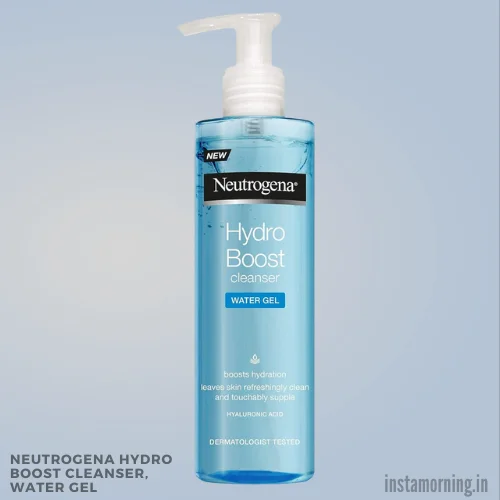Discover foundational steps for a complete skincare routine in this comprehensive skin care guide.
What is Skincare?
Skincare is a range of practices and routines designed to support and maintain the health and appearance of your skin. It encompasses various activities, products, and habits aimed at ensuring the integrity, vitality, and overall well-being of your skin.
Skin care practices may include cleansing, moisturizing, protection from the sun, and addressing specific skin concerns through the use of skincare products and treatments.
Why Is Skincare Important?

Skin care is important for several reasons:
Skin Health: Skin is the body’s largest organ and plays a vital role in protecting your internal organs and systems. Proper skincare helps maintain the health and function of your skin, which, in turn, supports your overall well-being.
Appearance: Skin care can enhance the appearance of your skin by improving its texture, tone, and radiance. It can also help reduce the signs of ageing, such as wrinkles, fine lines, and age spots.
Prevention: A good skincare routine can help prevent various skin issues, including acne, eczema, dermatitis, and skin infections. Regular care can strengthen the skin’s barrier function, making it less susceptible to irritation and damage.
Protection: Skin care products, especially those with sunscreen, can protect from harmful ultraviolet (UV) rays from the sun. This protection is essential in reducing the risk of skin damage, sunburn, and skin cancer.
Confidence: Healthy, well-maintained skin can boost your self-confidence. When your skin looks and feels good, it can have a positive impact on your self-esteem.
Why Skin Health Matters?
The importance of skin health is significant for various reasons, such as:
Protection from the External Environment: The skin is the body’s largest organ and serves as a crucial barrier between the body’s internal environment and the external world. It acts as a physical barrier, preventing harmful bacteria, viruses, and other pathogens from entering the body. Maintaining healthy skin is essential for this protective function.
Vitamin D Production: When exposed to sunlight, the skin produces vitamin D, which is essential for various bodily functions, including bone health, immune system function, and overall well-being. Healthy skin is necessary for the efficient production of vitamin D.
Sensory Perception: The skin contains nerve endings that allow us to sense and respond to the environment. It enables us to feel sensations like heat, cold, pain, and touch. Sensory perception through the skin is fundamental to our ability to interact with and adapt to the world around us.
Appearance and Self-Esteem: Healthy skin is often associated with a vibrant and attractive appearance. Clear, glowing skin can boost self-confidence and self-esteem. Feeling comfortable in one’s skin is essential for overall well-being and mental health.
Different Skin Types and Common Skin Concerns
Understanding your skin type is fundamental for effective skincare routines. Here are the five main skin types and their common concerns:
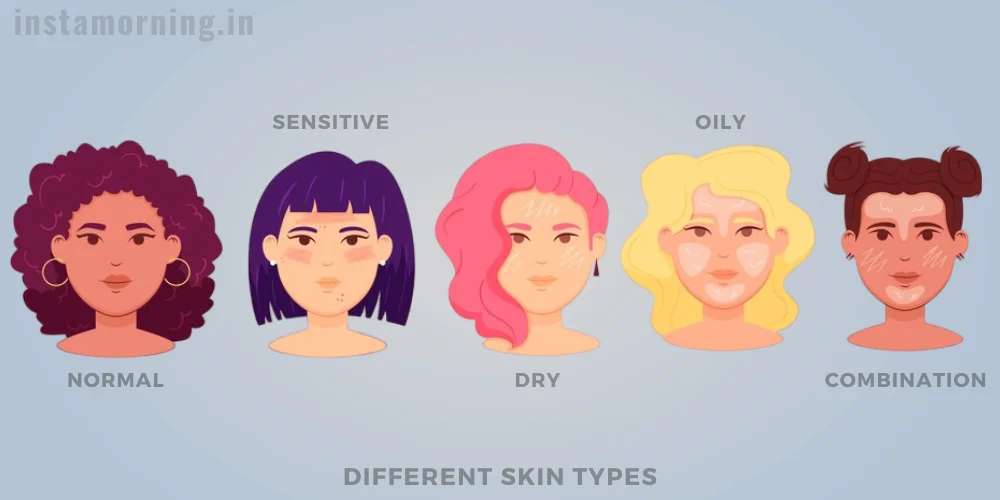
Skin Types
Normal Skin: Well-balanced, neither too oily nor too dry, with small pores and a smooth texture. Few major skin problems are typically present.
Dry Skin: Produces less sebum, leading to tightness, roughness, and flakiness, making it prone to wrinkles and fine lines.
Oily Skin: Overproduces sebum, resulting in a shiny appearance and susceptibility to blackheads and whiteheads.
Combination Skin: Exhibits both oily and dry areas, typically with an oily T-zone (forehead, nose, and chin).
Sensitive Skin: Easily irritated and prone to reactions, often displaying redness, itching, or discomfort in response to various factors.
Common Skin Concerns
Common Skin Concerns | Description |
Acne | Inflammation of sebaceous glands causes blackheads, whiteheads, pimples, and cysts. |
Eczema (Dermatitis) | A chronic condition characterized by dry, itchy skin, redness, and scaling. |
Psoriasis | Autoimmune disease causes rapid skin cell growth, resulting in thick, red patches with scales. |
Rosacea | Chronic condition leading to facial redness, flushing, and visible blood vessels. |
Hyperpigmentation | Darkened patches compared to surrounding skin due to sun exposure or skin conditions. |
Basketball Sneakers | Originally for basketball, now chosen for style; offer ankle support and cushioning. |
Signs of Aging | Development of wrinkles, fine lines, sagging, and age spots due to aging and sun exposure. |
Dryness, Dehydration | Lacking moisture, causing roughness, flakiness, and irritation. |
Sun Damage | Resulting from excessive exposure, leading to sunburn, premature aging, and an increased risk of cancer. |
Uneven Skin Tone | Resulting from pigmentation issues or environmental stressors. |
Skin Sensitivity | Easily irritated by products or environmental factors. |
It’s important to determine your specific skin type and concerns to select the most appropriate skincare products and routines.
Creating an Effective Skin Care Routine
Establishing a well-crafted skincare routine is essential for maintaining and enhancing the natural charm of your skin. The routine’s effectiveness depends on tailored and purposeful steps:

Skin Care Routine Basics
Cleansing: Initiate your routine by using a gentle cleanser suited to your skin type. Cleanse twice daily, morning and night, to eliminate dirt, oil, and impurities without stripping the skin.
Toning: Restore your skin’s pH balance and prep it for better product absorption. Toners can aid in minimizing pores and are beneficial for most skin types.
Serum Application: Apply specialized serums after toning. Serums contain concentrated active ingredients tailored to address individual skin concerns such as anti-aging or acne treatment.
Moisturizing: Hydrate and seal in serums with a moisturizer suitable for your skin type—apply both morning and night to maintain hydration.
Sun Protection: Shield your skin from harmful UV rays by applying a broad-spectrum SPF 30 or higher sunscreen each morning. Reapply if spending extended time outdoors.
Eye Care: Use eye creams targeting the delicate eye area to reduce fine lines and puffiness. Apply gently around the orbital bone both morning and night.
Exfoliation: Exfoliate once or twice weekly to eliminate dead skin cells. Use chemical or physical scrubs suited to your skin type.
Face Masks: Employ concentrated treatment masks once or twice a week after cleansing. Choose from clay, sheet, or cream masks that align with your skin’s needs.
Personalised Skin Care Routines
Tailoring your skincare routines to different times, environmental factors, and individual skin concerns is crucial. Customized routines should adjust to different times of day, night, week, and seasonal changes in summer and winter.
Whether it’s travel or daily activities, personalized routines aim to protect and rejuvenate your skin.
Sample Skincare Routines Based on Different Needs:
Morning Routine
- Cleanse to remove accumulated overnight impurities.
- Tone to balance skin pH.
- Apply a specialized serum.
- Moisturize and protect with sunscreen.
Evening Routine
- Employ a double cleansing method.
- Tone to prepare the skin.
- Apply a serum and eye cream.
- Use a richer night cream for overnight nourishment.
Weekly Routine
- Exfoliate to slough off dead skin cells.
- Pamper your skin with a face mask once a week.
Travel Routine
- Opt for travel-sized products for convenience.
- Carry a hydrating mist to combat dryness during travel.
- Apply sunscreen regularly and adjust skincare based on the climate.
Climate-Based Routines
- Adapt your routine for hot and humid, cold and dry, or temperate climates.
- Use lightweight (summer moisturiser) or heavier moisturizers (winter moisturiser) based on climate needs.
Remember that adapting your skincare routine to your lifestyle is key to maintaining healthy and vibrant skin.
Makeup Removal Tips
Properly removing makeup involves various steps and techniques, such as taking your time, using soap and water, selecting a makeup-removing cleanser, paying attention to eyelid edges and hairline, using flat cotton pads, and following up with moisturization.

Here are some makeup removal tips you can follow:
1. Take Your Time
When removing makeup, especially eye makeup, allow the makeup remover to sit for a few minutes. This softens mascara, eyeliner, and eyeshadow, making them easier to remove.
2. Soap and Water
Opt for soap and water for effective makeup removal. Makeup wipes can be used as an initial step but aren’t as effective as soap and water for thorough cleansing.
3. Choose the Right Cleanser
Use a cleanser specifically designed for makeup removal. Consider makeup removers like micellar water, cleansing oil, or cleansing balm for stubborn makeup.
4. Pay Attention to Detail
Be meticulous with makeup removal, especially around the edges of your eyelids. Use cotton swabs with olive oil for detailed work and avoid tugging on mascara to prevent damage.
5. Prevent Hairline Residue
Push back your hair or use a headband when washing your face to prevent makeup residue around the hairline. This helps avoid clogged pores and breakouts.
6. Flat Cotton Pads
Use flat cotton pads instead of cotton balls. They leave less residue and are less likely to shed fibres on your skin during makeup removal.
7. Follow Up with Moisturization
After removing makeup, always follow up with moisturization, especially for the sensitive eye area. This keeps the skin soft and hydrated.
8. Double Cleansing Approach
Consider a double cleansing approach for makeup removal. The first step involves using a makeup-removing product, like a cleansing balm, cleansing oil, or micellar water, to break down makeup gently. The second step includes using a regular cleanser to ensure the removal of leftover makeup, dirt, and impurities.
9. Use a Clean Face Towel
Always use a clean face towel during makeup removal to avoid transferring bacteria or makeup residue back onto your skin.
10. Special Tips for Lip and Eye Makeup
For removing pigmented or liquid lipsticks, apply cleansing oil and massage it in to prevent dry and damaged lips. Use oil-soaked Q-tips for effective eye makeup removal.
These tips will help ensure effective makeup removal and promote healthy skin.
Choosing Skincare Products Based on Your Skin Type
Understanding your skin type is crucial for an effective skincare regimen. Tailoring your skincare products to your skin’s specific needs can significantly enhance its health and appearance.
Different Skin Types and Specific Requirements
Let’s check out the specific requirements for various skin types:
Normal Skin
- Balanced and low-maintenance skin type.
- Basic care is sufficient; consider adding antioxidants for extra protection.
- Recommended Products:
- Various skincare products that maintain skin health.
- Antioxidant-rich products for extra protection.
Dry Skin
- Lacks moisture, leading to tightness and flakiness.
- Requires hydrating and nourishing products.
- Recommended Products:
- Hydrating products with ingredients like hyaluronic acid.
- Nourishing creams to combat dryness and maintain skin elasticity.
Oily Skin
- Prone to excess sebum production, leading to a shiny appearance.
- Necessitates oil-regulating products to prevent breakouts.
- Recommended Products:
- Products with salicylic acid to control excess oil and prevent breakouts.
- Oil-regulating and non-comedogenic skincare items.
Sensitive Skin
- Easily irritated and prone to redness or allergies.
- Calls for gentle, hypoallergenic products.
- Recommended Products:
- Soothing components like chamomile or aloe vera to manage sensitivity.
- Hypoallergenic and fragrance-free products to minimize irritation.
Combination Skin
- A mix of oily and dry areas necessitating a balanced approach.
- Requires a combination of products suitable for different skin areas.
- Recommended Products:
- Gel-based cleansers for balancing both oily and dry areas.
- Lightweight serums and non-greasy sunscreens are suitable for all skin types.
Guidelines for Choosing the Right Skincare Products
To make informed decisions in selecting the right skincare products, several factors should be considered, such as —
- Avoid Falling for Marketing Hype
- Prioritize the efficacy of ingredients over popularity and marketing gimmicks.
- Opt for products based on their formulation and ingredient effectiveness rather than trends.
- Beware of “Natural” Claims
- Not all natural ingredients are universally safe; prioritize certified products from regulatory bodies.
- Look for genuine certifications ensuring the safety of natural products.
- Understanding Ingredient Lists
- Concentration matters; ingredients listed prominently are more concentrated.
- Seek specific ingredients essential for your skincare needs listed higher in product formulations.
- Perform Patch Tests
- Apply a small amount of new skincare products on a discreet area to test for reactions.
- Crucial step to prevent irritation or allergic reactions, especially for sensitive skin.
- Choose Cruelty-Free
- Opt for products that do not engage in animal testing.
- Look for certifications or statements confirming the brand’s cruelty-free practices.
- Ingredients to Avoid
- Fragrances, sulfates, parabens, and formaldehyde are known to be harmful or irritating to the skin.
- Check product labels to avoid these potential skin irritants.
- Beneficial Ingredients to Seek
- Glycerin for hydration, ceramides for skin barrier maintenance, and vitamins (C, E, B3, and B5) for skin benefits.
- Look for these ingredients in skincare products for effective results.
Natural and Organic Skincare Options
You can also opt for natural and organic skincare:
Natural Skincare
- Utilizes ingredients from natural sources like botanical extracts and essential oils.
- Focuses on minimally processed elements for gentle and effective skincare.
Organic Skincare
- Uses organically farmed or sustainably harvested ingredients.
- Avoids synthetic additives for skin health and environmental sustainability.
Dermatologist-Approved Skincare
- Expert-Endorsed Products
- Formulated with dermatologist-approved ingredients.
- Safe and effective for various skin types and conditions.
By following these tips, you can make more informed choices when selecting skincare products and maintain healthy, radiant skin.
Common Skin Concerns
Our skin, being the largest organ of the body, is susceptible to various conditions influenced by genetics, lifestyle, environmental factors, and overall health.
Understanding these skin conditions and their causes is crucial for implementing effective skincare regimens and seeking appropriate treatments.
These concerns can manifest in numerous ways. The most common skin problems include:
Acne:
Causes: Excess oil production, clogged pores, bacterial inflammation, and hormonal changes.
Signs: Pimples, blackheads, whiteheads, cysts, and nodules.
Treatment: Over-the-counter and prescription treatments, lifestyle changes, and avoiding triggers.
Rosacea:
Causes: Genetic factors, environmental triggers, and immune responses.
Signs: Facial redness, flushing, visible blood vessels, and thickened skin.
Treatment: Topical and oral medications, laser therapy, lifestyle adjustments, and avoiding triggers.
Eczema:
Causes: Genetic, environmental, and immune system factors.
Signs: Dry, itchy, red, inflamed skin, and blisters.
Treatment: Moisturizers, topical and oral medications, phototherapy, lifestyle changes, and avoiding triggers.
Hyperpigmentation:
Causes: Sun exposure, hormonal changes, skin injuries, certain medications, and medical conditions.
Signs: Darkened skin patches or blemishes.
Treatment: Over-the-counter products, prescription medications, cosmetic procedures, and lifestyle changes.
Signs of Aging:
Causes: Reduced collagen and elastin, UV exposure, lifestyle habits, and hormonal changes.
Treatment: Topical products, cosmetic procedures, lifestyle habits like sunscreen use, healthy diet, exercise, and hydration.
Dry Skin:
Causes: Insufficient moisture in the skin.
Treatment: Moisturizing regularly, avoiding harsh soaps, lifestyle changes, and using gentle skincare products to take care of dry skin.
Let us understand these skin-related problems and concerns in detail:
Acne
Acne is a common skin condition resulting in pimples, blackheads, and whiteheads. It’s commonly observed among teenagers but can affect individuals of all ages.
The causes of acne include excess oil production, clogged pores due to the accumulation of dead skin cells, oil, and bacteria, bacterial inflammation caused by Propionibacterium acnes (P. acnes), and hormonal changes.
Signs of acne include pimples (raised bumps), blackheads (open pores filled with oil and dead skin cells), whiteheads (closed pores filled with oil and dead skin cells trapped under the skin’s surface), cysts (deep, painful bumps filled with pus), and nodules (firm, solid bumps deep under the skin).
Acne treatment varies based on severity:
- Over-the-counter treatments: Mild acne can often be treated with products containing benzoyl peroxide, salicylic acid, or sulfur to kill bacteria, dry out excess oil, and exfoliate the skin.
- Prescription treatments: Severe acne may require prescription medications like topical treatments (retinoids, antibiotics, azelaic acid) and oral medications (antibiotics, isotretinoin, spironolactone).
- Lifestyle changes: Practicing good skincare habits (washing the face twice daily, avoiding touching the face), using oil-free and non-comedogenic skincare products, following a healthy diet, getting enough sleep, and maintaining a stress-free lifestyle can also help manage acne.
Additionally, it’s advisable not to pop pimples, use a moisturizer to prevent dryness from acne treatments, wear sunscreen, and manage stress to avoid triggering acne breakouts.
For persistent or severe acne that doesn’t respond to over-the-counter treatments, consulting a dermatologist is recommended to devise an appropriate treatment plan.
Rosacea
Rosacea is a chronic skin condition characterized by persistent redness, flushing, and the appearance of pimples on the face. It’s more prevalent in adults above 30.
The signs of rosacea include facial redness, flushing, pimples, visible blood vessels, thickened skin, and eye irritation. The causes involve genetic factors, environmental triggers, and immune responses.
Treatment for rosacea typically includes:
- Topical medications: Such as metronidazole, azelaic acid, or ivermectin applied directly to the skin.
- Oral medications: Antibiotics, isotretinoin, or spironolactone taken by mouth.
- Laser therapy: To minimize visible blood vessels and thickened skin.
- Lifestyle changes: Avoiding triggers, using gentle skincare products, keeping the skin hydrated, regular sunscreen application, and managing stress effectively.
If dealing with rosacea, it’s crucial to remain consistent with treatment and patient, as results may take weeks or even months to show. Consulting a dermatologist is advisable if rosacea does not respond to over-the-counter treatments or causes concern.
Additional management tips include avoiding popping pimples, using moisturizer to combat dryness, applying sunscreen daily, and practising stress-relief techniques like exercise, yoga, or meditation.
Eczema
Eczema is a chronic skin condition characterized by dry, itchy skin. It’s prevalent in all age groups but particularly common in children. It occurs due to a blend of genetic, environmental, and immune system factors.
Signs of eczema include dry, itchy, red, inflamed skin, thickening, blisters, cracking, and crusty or scaly patches.
Triggers for eczema encompass dry air, irritants like soaps, detergents, and allergens such as pollen, dust mites, and pet dander, among other factors like sweat, stress, hormonal changes, and certain medications.
Treatment for eczema involves various approaches:
- Moisturizers to maintain skin hydration and reduce itching.
- Topical medications to alleviate inflammation and itching, like corticosteroids, calcineurin inhibitors, and phosphodiesterase-4 inhibitors.
- Oral medications such as antihistamines, corticosteroids, and cyclosporine to control inflammation and itching if topical treatments aren’t effective.
- Phototherapy utilizes UV light to lessen inflammation and itching.
Lifestyle changes that can assist in managing eczema involve avoiding triggers, using gentle soaps and detergents, refraining from scratching, consistently moisturizing, and wearing loose-fitting cotton clothes.
To manage eczema effectively, it’s essential to maintain patience, and consistency with treatment, and consult a dermatologist if the condition doesn’t improve or worsens despite over-the-counter treatments.
Additional management tips include avoiding harsh soaps, immediate moisturizing after bathing, keeping nails short, wearing gloves for household tasks, avoiding tight clothing, and managing stress through exercise, yoga, or meditation.
Hyperpigmentation
Hyperpigmentation refers to a skin condition marked by darkened patches or blemishes on the skin, often occurring in areas exposed to the sun. The signs include dark skin patches or melasma, particularly on the face, hands, neck, or chest.
Causes:
- Sun Exposure: UV rays stimulate melanin production, causing the skin to darken.
- Hormonal Changes: Hormonal fluctuations during pregnancy, menopause, or puberty.
- Skin Injuries: Scars from acne, cuts, or burns can result in hyperpigmentation.
- Certain Medications: Some drugs, such as birth control pills or chemotherapy medications.
- Medical Conditions: Conditions like Addison’s disease or melasma can lead to hyperpigmentation.
Treatment:
- Over-the-counter Products: Available options include hydroquinone, kojic acid, and retinoids.
- Prescription Medications: These may include tretinoin, azelaic acid, or hydrocortisone cream.
- Cosmetic Procedures: Chemical peels, microdermabrasion, and laser therapy are effective treatments.
Lifestyle Changes:
- Limit sun exposure and use SPF 30+ sunscreen.
- Regularly moisturize to maintain skin health.
- Address acne promptly.
- Avoid personal triggers, particularly for conditions like melasma.
Seeking advice from a dermatologist is recommended for tailored guidance on treating hyperpigmentation.
Anti-aging
Anti-aging refers to efforts aimed at reducing the visible signs of aging and maintaining a youthful appearance.
Signs of aging may include fine lines, wrinkles, sagging skin, age spots, and loss of skin elasticity. The causes of aging skin include factors such as reduced collagen and elastin production, exposure to UV rays leading to sun damage, lifestyle habits like smoking, stress, and poor nutrition.
Treatment options to address aging signs include using:
- Topical products containing retinoids, antioxidants, and peptides.
- Procedures such as chemical peels, microneedling, laser therapy, and injectables like Botox or fillers are also available to minimize wrinkles and restore skin volume.
Lifestyle habits like wearing sunscreen, a healthy diet, exercise, and adequate hydration also contribute to anti-aging efforts. Consulting a dermatologist for tailored advice is advisable for managing and treating signs of aging effectively.
Dry skin
Dry skin, a common skin condition, occurs when the skin lacks sufficient moisture. Here are the key elements:
Signs of Dry Skin:
- Dry, itchy skin
- Redness
- Roughness
- Flaking
- Cracking
- Ashiness
Causes and Triggers of Dry Skin:
- Genetics: Some individuals are more predisposed to dry skin.
- Climate: Cold, dry weather often leads to dry skin.
- Skin conditions: Eczema and psoriasis can cause dryness.
- Shower Habits: Long, hot showers and baths, harsh soaps, and detergents.
- Medication: Certain medications, such as diuretics and retinoids, can trigger dry skin.
Treatment for Dry Skin:
- Over-the-counter Products: Moisturizers, humectants (like glycerin or hyaluronic acid), and occlusives (such as petrolatum or mineral oil) can help hydrate the skin.
- Prescription Medications: Topical corticosteroids, retinoids, and antibiotics could be prescribed for severe dry skin or related conditions.
- Lifestyle Changes: Avoiding hot showers, using gentle soaps, applying moisturizer regularly, and utilizing a humidifier can help manage and prevent dry skin.
Oily skin
Oily skin is a skin condition where the sebaceous glands produce an excess of sebum, leading to specific signs and symptoms:
Signs of Oily Skin:
- Shiny complexion.
- Enlarged pores.
- Presence of blackheads and whiteheads.
- Increased susceptibility to pimples.
Causes of Oily Skin:
- Genetics: Some individuals are naturally predisposed to produce more sebum.
- Hormonal changes: Puberty, pregnancy, and menopause can lead to increased oil production.
- Environmental factors: Hot and humid weather can trigger sebum overproduction.
- Stress: Stress can contribute to increased oil secretion.
- Certain medications: Some drugs, like corticosteroids and birth control pills, might cause oily skin.
Treatment for Oily Skin:
- Use Suitable Cleansers and Moisturizers: Look for products labelled “oil-free” and “non-comedogenic” to reduce oil production and improve the skin’s appearance.
- Prescription Medications: Severe cases might require prescription treatments like retinoids and antibiotics.
- Lifestyle Changes: Regularly washing the face, gentle exfoliation, avoiding face touching, maintaining a healthy diet, getting enough sleep, and managing stress can help manage oily skin.
Sensitive skin
Sensitive skin refers to a skin condition characterized by heightened reactivity and vulnerability to various external and internal factors. Individuals with sensitive skin are more prone to experiencing adverse reactions or irritation from substances or conditions that might not typically affect others.
Signs of Sensitive Skin:
- Redness
- Itching
- Dryness
- Flaking
- Stinging
- Burning
- Rashes
Causes/Triggers of Sensitive Skin:
- Environmental Irritants: Exposure to elements like cold weather, wind, and excessive sun exposure.
- Skin Care Products: Harsh soaps, detergents, and cosmetics containing chemicals that can irritate sensitive skin.
- Foods and Drinks: Certain items such as spicy foods, caffeine, and alcohol might trigger skin sensitivity.
- Medications: Some medications like antibiotics and retinoids might cause skin reactions.
- Stress: Emotional stress can also contribute to the exacerbation of skin sensitivity.
Treatment for Sensitive Skin:
- Avoid Triggers: The most effective way to manage sensitive skin is by steering clear of known triggers.
- Use Gentle Skin Care Products: Choose mild, fragrance-free, and gentle skincare items that avoid harsh chemicals or alcohol.
- Regular Moisturizing: Maintain skin hydration by using a mild, fragrance-free moisturizer regularly.
- Cool Showers and Baths: Opt for shorter, cooler showers or baths to prevent skin dryness.
- Gentle Drying: After bathing, pat the skin dry gently rather than rubbing it aggressively.
Lifestyle Changes:
- Stress Management: Practice stress-relieving techniques such as exercise, yoga, or meditation to minimize stress-induced skin reactions.
- Healthy Diet: Consume a balanced diet, avoiding processed sugars and fats, as they can irritate sensitive skin.
- Adequate Sleep: Ensure a good night’s sleep as it’s crucial for overall health, including skin well-being.
Additional Tips:
- Loose-Fitting Clothing: Wear loose-fitting, comfortable clothes to minimize skin irritation.
- Hygiene Practices: Regularly launder bedding and towels in hot water to avoid skin irritants.
- Use of Humidifiers: Employ humidifiers to add moisture to the air, preventing skin dryness.
- Avoid Strong Scents: Refrain from using strong-scented products and air fresheners that might trigger skin reactions.
- Consult a Professional: Discuss with a healthcare provider any medications that could be causing skin irritation.
Skin Care Products and Ingredients
Skin care products are topical substances applied to the skin, designed to enhance its health, appearance, and overall well-being. These products serve various functions, including cleansing, moisturizing, protection from the sun, and targeting specific skin concerns.
Let us explore at-home skin care with a variety of products tailored to different skin needs.
Cleansers
Cleansers are skincare products designed to eliminate dirt, oil, makeup, and other impurities from the skin. They play a fundamental role in any skincare routine, aiding in maintaining clean and healthy skin by removing accumulated impurities.
There are various types of cleansers, each tailored to specific skin needs:
Gel Cleansers: Gel-based formulations are lightweight and refreshing. They’re beneficial for oily or acne-prone skin as they often contain ingredients like salicylic acid or benzoyl peroxide, which help regulate oil production and combat acne-causing bacteria.
Foam Cleansers: Similar to gel cleansers, foam-based products generate a foamy lather when applied. They work well for oily or acne-prone skin, aiding in the removal of excess oil and debris.

Cream Cleansers: Creamy cleansers are thicker and more hydrating than gels or foams. They’re suited for dry or sensitive skin types as they cleanse without stripping the skin of its natural oils.

Micellar Water: Micellar water functions as a gentle cleanser composed of micelles, which are oil-attracting molecules. This type of cleanser is versatile and suitable for all skin types, including sensitive skin.

The ingredients in cleansers can vary based on their type and intended purpose:
Surfactants: These compounds create lather in cleansers and work by reducing water’s surface tension to remove oil and dirt from the skin.
Emollients: They aid in softening and moisturizing the skin, frequently used in cleansers designed for dry or sensitive skin.
Humectants: These ingredients attract moisture to the skin and are common in cleansers intended for dry or sensitive skin.
Active Ingredients: Cleansers may include specific active ingredients to address particular skin concerns such as acne, hyperpigmentation, or rosacea. Examples include salicylic acid, benzoyl peroxide, glycolic acid, and lactic acid.
Selecting the right cleanser requires consideration of your skin type and concerns:
For Oily or Acne-Prone Skin: Look for oil-free, non-comedogenic cleansers like gel or foam formulations.
For Dry or Sensitive Skin: Opt for gentle, hydrating cleansers such as cream cleansers or micellar water.
Mature Skin: Choose nourishing and gentle cleansers that hydrate, such as cream cleansers or micellar water.
For Specific Skin Concerns: If you have distinct concerns like acne, hyperpigmentation, or rosacea, select a cleanser with ingredients to address those issues.
Moisturizers
Moisturizers are products specifically designed to hydrate the skin, maintaining moisture levels and preventing dryness. They function by creating a protective barrier on the skin’s surface to trap moisture within. They play an essential role in every skincare routine, supporting the skin in looking and feeling healthy.
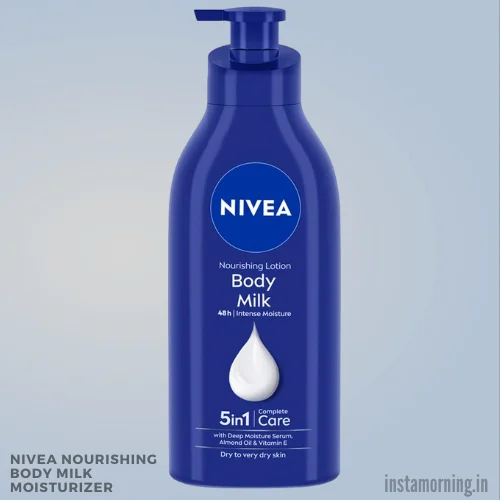
Types of Moisturizers:
Lotions: Lightweight and quickly absorbed, ideal for oily or combination skin.
Face Moisturizers: Face moisturizers are skincare products that hydrate and nourish facial skin, especially during harsh weather like the winter in India, preventing dryness and promoting a healthy complexion.
Creams: Thicker than lotions, providing enhanced hydration. Great for dry or normal skin.
Ointments: The thickest and most occlusive type, best suited for very dry skin or specific skin conditions like eczema and psoriasis.
Ingredients in Moisturizers:
Ingredients in moisturizers may differ based on the specific type and desired outcomes. Common elements include:
Humectants: These draw water into the skin. Common examples are glycerin, hyaluronic acid, and propylene glycol.
Emollients: Ingredients that soften and smoothen the skin, such as petrolatum, lanolin, and mineral oil.
Occlusives: Form a barrier on the skin to prevent moisture loss. Common occlusives include petrolatum, lanolin, and mineral oil.
Active Ingredients: Target specific skin concerns such as wrinkles, fine lines, and hyperpigmentation. Retinol, vitamin C, and niacinamide are some common active ingredients.
How to Choose the Right Moisturizer:
Oily Skin: Opt for an oil-free and non-comedogenic (won’t clog pores) moisturizer, like lotions.
Dry Skin: Choose thick and creamy formulations like ointments or creams for adequate hydration.
Combination Skin: Lightweight, quick-absorbing lotions suit combination skin.
Sensitive Skin: Fragrance-free and hypoallergenic lotions or creams are ideal for sensitive skin.
Specific Concerns: For concerns like wrinkles or hyperpigmentation, select moisturizers tailored to address these issues.
Additional Tips for Moisturizer Use:
- Apply moisturizer to damp skin for better absorption.
- Use an SPF of 30 or higher daily, regardless of weather conditions.
- Reapply moisturizer as needed, especially for dry skin.
- Avoid moisturizers containing harsh chemicals or fragrances.
- For sensitive or acne-prone skin, choose fragrance-free and non-comedogenic moisturizers.
Also Read — Best Moisturizer For Summer In India Best Winter Moisturizers In India
Toners
Toners are skin care products designed to eliminate any residual dirt, oil, and makeup from the skin after cleansing. They serve to balance the skin’s pH and prepare it for subsequent skin care products.
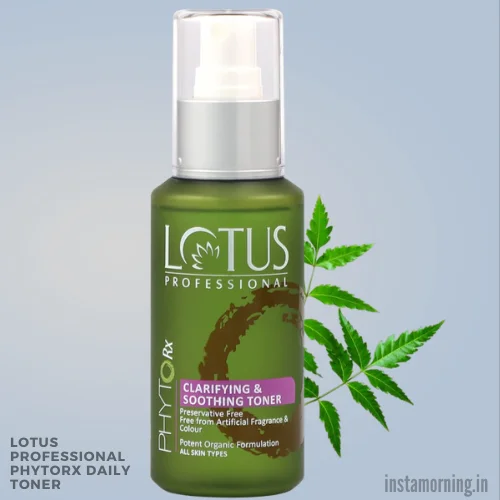
Types of Toners:
Alcohol-based and Non-Alcohol-based Toners:
Alcohol-based Toners: These toners contain ethanol or isopropyl alcohol. While effective at removing oil and dirt, they can also be drying and irritating.
Non-Alcohol-based or Natural Toners: A “natural” face toner is a toner without alcohol, preservatives, or synthetic ingredients. Gentler on the skin, these toners often contain ingredients like witch hazel, rose water, and hyaluronic acid.
Ingredients in Toners:
Witch Hazel: Acts as a natural astringent, tightening pores and reducing oil production.
Rose Water: Provides gentle and soothing hydration, balancing the skin’s pH.
Hyaluronic Acid: A humectant that attracts water to the skin, keeping it hydrated and plump.
Alpha Hydroxy Acids (AHAs): Such as glycolic acid and lactic acid, they aid in removing dead skin cells and brightening the complexion.
Beta Hydroxy Acids (BHAs): For example, salicylic acid, which assists in exfoliating the skin and reducing acne breakouts.
Choosing the Right Toner for Your Skin Type:
Oily or Acne-prone Skin: Opt for alcohol-free toners with witch hazel or salicylic acid.
Dry or Sensitive Skin: Choose alcohol-free toners containing rose water or hyaluronic acid.
Normal or Combination Skin: Both alcohol-based and non-alcohol-based toners can work.
Specific Concerns: If you have specific concerns like hyperpigmentation or wrinkles, pick a toner with targeted ingredients.
Additional Tips for Using Toners:
- Apply toner on a clean, damp face.
- Use a cotton ball or pad to apply the toner, or gently splash it on your face.
- Avoid contact with the eyes.
- Allow the toner to completely dry before applying other skin care products.
- Selecting the right toner according to your skin’s needs is vital for a beneficial skincare routine.
Exfoliants
Exfoliants are skincare products designed to remove dead skin cells from the skin’s surface, promoting a brighter, smoother, and more even-toned complexion. Exfoliation also enhances the absorption of other skincare products and can reduce the appearance of fine lines and wrinkles.

Types of Exfoliants:
Physical Exfoliants: These use granules or beads to remove dead skin cells manually. Examples include scrubs, brushes, and loofahs.
Chemical Exfoliants: They utilise acids to dissolve the bonds that attach dead skin cells to the skin surface. Common examples are AHAs, BHAs, and PHAs.
Ingredients in Exfoliants:
Physical Exfoliants: Sugar, salt, coffee grounds, and jojoba beads are among the common physical exfoliant components.
Chemical Exfoliants: Glycolic acid, lactic acid, salicylic acid, and mandelic acid are frequently used chemical exfoliants.
Choosing the Right Exfoliant for Your Skin Care:
Oily or Acne-prone Skin: Opt for small, round beads in physical exfoliants or a chemical exfoliant with salicylic acid.
Dry or Sensitive Skin: Choose gentle physical exfoliants like jojoba beads or a chemical exfoliant containing PHAs, such as mandelic acid.
Normal or Combination Skin: Both physical and chemical exfoliants are suitable options.
Additional Tips for Using Exfoliants:
- Frequency: Exfoliate two to three times per week, adjusting based on your skin type.
- Gentleness: Exfoliate gently, avoiding over-exfoliation as it can irritate the skin.
- Follow-up with Moisturizer: Apply moisturizer post-exfoliation to soothe and hydrate the skin.
Exfoliation can significantly benefit a skincare routine. Choose the right exfoliant for your skin type and concerns, ensuring a gentle exfoliation routine without overdoing it.
Masks
Face Masks are skin care products applied to the face for a short period to deliver a concentrated dose of active ingredients. They come in various forms and target diverse skin concerns.
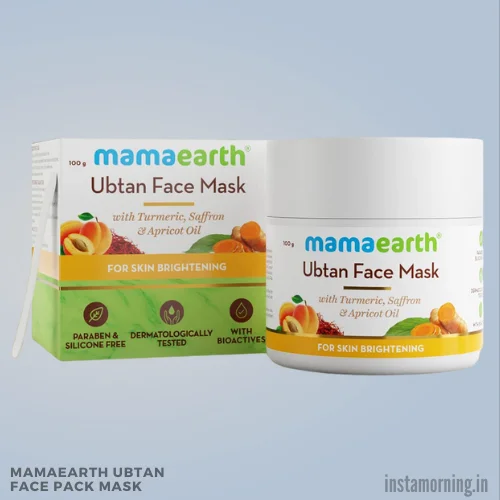
Different Types of Face Masks:
Clay Masks: Ideal for absorbing oil and dirt, often used for acne and oily skin treatment.
Charcoal Masks: Efficient in absorbing impurities, detoxifying skin, and eliminating blackheads.
Sheet Masks: Pre-cut masks made from materials like cotton, hydrogel, or biocellulose, infused with active ingredients such as hyaluronic acid, vitamin C, or niacinamide.
Cream Masks: Thick and creamy masks are mainly used for hydrating and nourishing the skin, often including ingredients to address specific skin concerns.
Ingredients in Face Masks:
Clay: Effective absorbent that helps remove oil and dirt.
Charcoal: Absorbent that detoxifies skin and removes impurities.
Hyaluronic Acid: A humectant that attracts water to keep the skin hydrated and plump.
Vitamin C: An antioxidant that protects the skin and brightens the complexion.
Niacinamide: A form of vitamin B3 that reduces fine lines, and wrinkles, and improves the skin’s barrier function.
Selecting Face Masks for Skin Care:
Oily or Acne-Prone Skin: Opt for clay or charcoal masks to address excess oil and impurities.
Dry Skin: Choose cream masks containing hydrating ingredients like hyaluronic acid.
Sensitive Skin: Select gentle masks without harsh chemicals or fragrances.
Specific Concerns: For hyperpigmentation or wrinkles, choose masks targeted to those issues.
Additional Tips for Using Face Masks:
- Apply to clean, dry skin.
- Follow the time specified on the packaging for the mask to remain on your face.
- Rinse off the mask with warm water and pat your skin dry.
- Apply moisturizer post-face mask to soothe and hydrate the skin.
Serums
Serums are highly concentrated skin care products that deliver potent active ingredients deep into the skin. They are designed to target specific skin concerns and provide solutions such as reducing wrinkles, fine lines, hyperpigmentation, acne, and dryness.
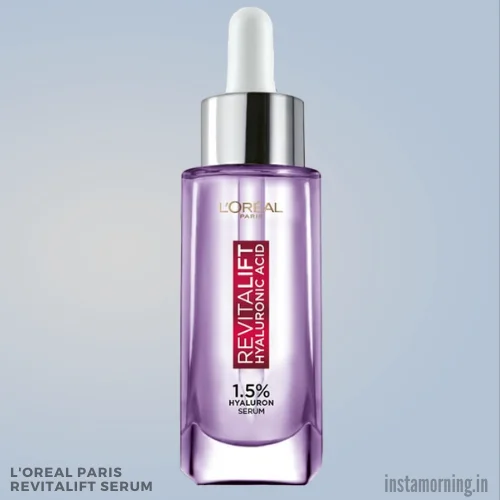
Different Types of Serums:
Anti-Aging Serums: These contain retinol, hyaluronic acid, and vitamin C to diminish wrinkles, fine lines, and age spots.
Brightening Serums: With ingredients like vitamin C and niacinamide, these serums even out skin tone and reduce hyperpigmentation.
Acne Serums: Formulated with ingredients such as salicylic acid and benzoyl peroxide to treat and prevent acne breakouts.
Hydrating Serums: Contain hyaluronic acid and glycerin to moisturize and plump the skin.
Ingredients Present in Serums:
Retinol: Diminishes the appearance of wrinkles, fine lines, and age spots.
Hyaluronic Acid: Acts as a humectant, keeping the skin hydrated and plump.
Vitamin C: An antioxidant that protects the skin from damage and brightens the complexion.
Niacinamide: Reduces fine lines and wrinkles while enhancing the skin’s barrier function.
Salicylic Acid: A BHA exfoliant that unclogs pores, commonly used to treat acne breakouts.
Benzoyl Peroxide: An antibacterial agent effective in combating acne-causing bacteria.
Selecting Serums for Skin Care:
Oily or Acne-Prone Skin: Opt for serums containing salicylic acid or benzoyl peroxide.
Dry Skin: Choose serums with hydrating ingredients like hyaluronic acid or glycerin.
Sensitive Skin: Select gentle serums without harsh chemicals or fragrances.
Specific Concerns: Pick serums targeted for concerns such as hyperpigmentation or wrinkles.
Additional Tips for Using Serums:
- Apply to clean, dry skin.
- Let the serum dry before applying other skin care products.
- Use serums once or twice daily according to your skin type and the serum’s instructions.
Sunscreens
Sunscreens are topical products designed to protect the skin from the harmful effects of ultraviolet (UV) rays. These UV rays, specifically UVA and UVB, can cause sunburn, premature aging, and increase the risk of skin cancer.

Different Types of Sunscreens:
Chemical Sunscreens: These sunscreens work by absorbing UV rays and converting them into heat, which is then released from the body. Common chemical sunscreen ingredients include avobenzone, oxybenzone, and octinoxate.
Mineral Sunscreens: These work by sitting on the surface of the skin and reflecting UV rays away from the body. Common mineral sunscreen ingredients include zinc oxide and titanium dioxide.
SPF (Sun Protection Factor):
SPF measures how effectively a sunscreen protects against UVB rays, which are primarily responsible for causing sunburn. The SPF level ranges from 2 to 70, with higher SPF levels providing more protection.
Different SPF Levels:
SPF 30 blocks around 97% of UVB rays.
SPF 50 blocks about 98% of UVB rays.
SPF 70 blocks roughly 99% of UVB rays.
Ingredients in Sunscreens:
Chemical Sunscreen Ingredients: Avobenzone, oxybenzone, octinoxate, homosalate, and octisalate.
Mineral Sunscreen Ingredients: Zinc oxide and titanium dioxide.
Broad-Spectrum Sunscreens: Some sunscreens contain both chemical and mineral sunscreen ingredients, ensuring protection against both UVA and UVB rays.
Selecting the Right Sunscreen for Skin Care:
Skin Type: Consider your skin type when choosing a sunscreen. For instance, if you have oily skin, a gel or oil-free sunscreen might be more suitable.
SPF Level: Opt for a sunscreen with an SPF of 30 or higher for daily use.
Broad-Spectrum Protection: Choose a broad-spectrum sunscreen that offers protection against both UVA and UVB rays.
Water Resistance: If you anticipate swimming or sweating, choose a water-resistant sunscreen.
Additional Tips for Using Sunscreens:
- Apply sunscreen generously to all exposed skin, including the face, ears, neck, and hands.
- Reapply sunscreen every two hours or more frequently if swimming or sweating.
- Wear sunglasses and a hat to shield your eyes and face from the sun.
- Seek shade during the sun’s peak hours when rays are strongest.
Home Remedies For Skincare
Home remedies for skin refer to natural, at-home treatments using various ingredients often found in kitchens or easily accessible. These remedies aim to improve skin health, offering benefits such as moisturization, anti-inflammatory properties, skin lightening, and general skin health enhancement.
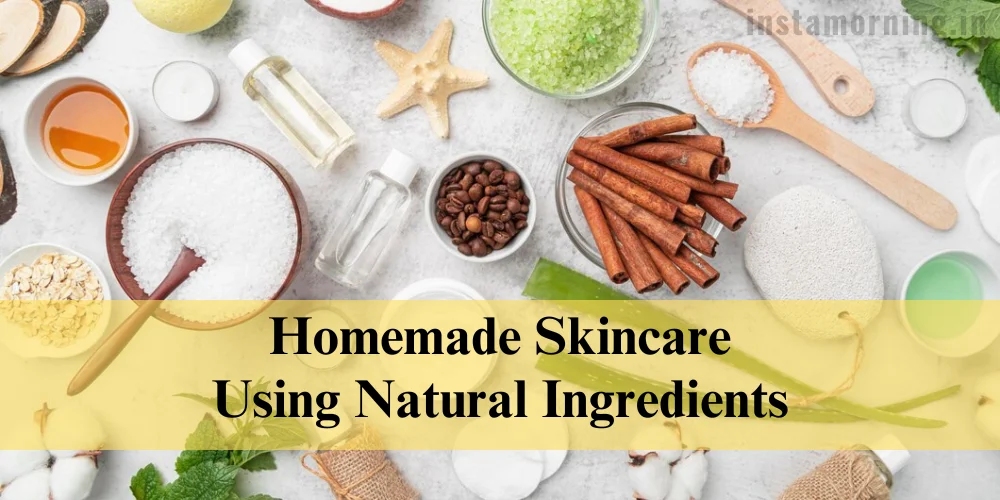
Ingredients
The main ingredients used in these home remedies for glowing skin include:
- Turmeric: Contains curcumin and antioxidants.
- Honey: Rich in glucose, sucrose, and antioxidants.
- Olive Oil: Contains antioxidants and vitamins A, D, E, and K.
- Orange/Lemon Juice: Rich in Vitamin C, citric acid, and antioxidants.
- Milk and dairy products: Contain tyrosine, lactic acid, and Vitamins D and A.
- Besan (gram flour): Acts as a natural exfoliator.
- Cucumber: Contains antioxidants, folic acid, and vitamins. Beneficial for delicate areas like the lips and around the eyes.
- Papaya: Contains papain, chymopapain, and vitamins.
- Aloe Vera: Rich in vitamins and antioxidants.
- Yoghurt: Rich in lactic acid.
- Oats: Acts as an exfoliator, rich in zinc.
- Almonds: Rich in Vitamin E and antioxidants.
- Coconut Oil: Rich in antioxidants and fatty acids.
- Banana: Rich in potassium, vitamins A, and B.
- Saffron: Known for lightening the skin tone and promoting glow.
- Apple Cider Vinegar (ACV): helps reduce acne and maintain skin health.
These ingredients are used in various combinations and application methods to address specific skin types and concerns, providing a natural and holistic approach to skincare.
Each ingredient has specific benefits for the skin, such as moisturizing, exfoliating, anti-inflammatory, or antioxidant properties.
Essential Oils
Essential oils are used for skin due to their natural properties that offer various benefits. Different essential oils, such as lavender, tea tree, rosemary, and others, contain compounds that can be beneficial for the skin.

They possess anti-inflammatory, antibacterial, and antioxidant properties that may help address skin concerns like acne, dryness, oiliness, and signs of aging.
These oils are often diluted and applied topically to the skin to potentially help with various skin issues and promote overall skin health. It’s essential to use essential oils with caution, as they are highly concentrated and can cause irritation if not properly diluted.
The use of essential oils varies from inhalation through diffusers, direct application, massage, and incorporating them into bath routines. It’s important to always dilute them with a carrier oil.
When acquiring essential oils, it’s recommended to purchase from reputable sources to ensure purity and quality. Some of the suggested places to buy include Amazon, Eden Botanicals, and Mountain Rose Herbs.
The main essential oils used for skincare depend on specific skin types and conditions:
1. Essential Oils for Dry Skin:
Lavender: Lavender oil helps balance moisture levels in the skin, reducing redness and hydrating dry skin without making it greasy.
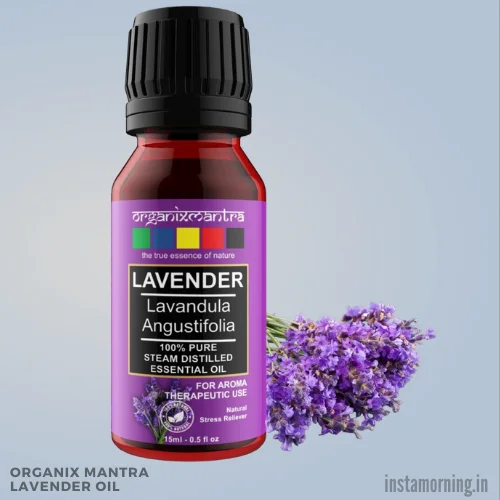
Chamomile: Chamomile oil increases moisture and reduces inflammation, but individuals with ragweed allergies should avoid it.
Sandalwood: Sandalwood oil reduces inflammation while promoting skin moisture.
2. Essential Oils for Oily Skin:
Clary Sage: Clary sage oil helps control excess sebum production, control acne, and reduce the appearance of wrinkles.
Rosemary: Rosemary oil has anti-inflammatory properties and can help regulate excess sebum.

Frankincense: Frankincense is believed to alleviate oily and acne-prone skin while providing lipids for ageing skin.
Geranium: Geranium oil can help balance skin oils and hydration levels.
Neroli: Neroli oil may balance sebum production without overdrying the skin.
3. Best Essential Oils for Sensitive Skin:
Lavender: Known for its soothing and calming properties, beneficial for sensitive skin due to its gentle nature.
Frankincense: Often used for its anti-inflammatory qualities, potentially helpful in managing sensitive skin.
Sandalwood: Contains properties that could be soothing and beneficial for sensitive skin due to its mild nature.

4. Essential Oils for Acne Prone Skin:
Rosemary: Helps fight the acne bacteria from getting into your pores.
Frankincense: Effective against acne and inflammation.
Clary Sage: Used for acne and oily skin.
Lemon: Helps fight inflammation and free radicals.
Lemongrass: Acts as an antimicrobial and removes dead skin cells.
Cinnamon: Contains antioxidant compounds that help with inflammatory acne.
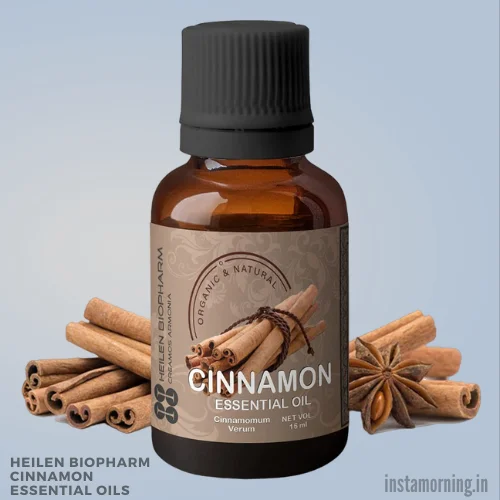
Tea Tree Oil: Known for its antiseptic properties.
5. Essential Oils for Skin Rashes:
Thyme and Lavender: A combination used to treat eczema.
Lavender: Known for its calming and anti-inflammatory properties, it helps soothe skin irritation and rashes.
Cinnamon: With antioxidant compounds, it may assist in managing inflammatory skin conditions, like rashes.
Geranium: Believed to have soothing and anti-inflammatory properties, potentially aiding in managing skin rashes.
6. Essential Oils for Pigmentation:
Pomegranate: Contains antioxidants and anti-inflammatory properties.
Carrot Seed: Used to decrease scarring and reduce wrinkles.
Tangerine: Promotes smoother, more even skin.
Ylang Ylang: May help inhibit skin pigmentation.
7. Essential Oils for Mature Skin and AntiAging:
Rose: Promotes skin cell turnover and may reduce lines.
Myrrh: Used for antiaging and circulation promotion.
DIY Skin Care Recipes
DIY skincare products can be a cost-effective and natural way to address various skin concerns. Several simple recipes for homemade skincare using natural ingredients commonly found at home or in local stores.

For instance, a DIY face mask with ingredients like honey, yoghurt, and turmeric can be beneficial for brightening and hydrating the skin.
Another popular DIY recipe involves making a gentle exfoliating scrub using sugar or coffee grounds mixed with coconut oil or honey, ideal for removing dead skin cells and promoting smoother skin texture.
Here are some more DIY Skin care recipes:
Oatmeal, Milk & Honey Exfoliating Face Mask: Uses oatmeal, honey, and milk for exfoliation suitable for all skin types.
Green Tea & Aloe Vera Refreshing Facial Mist: Utilizes green tea and aloe vera for skin refreshment.
Coconut Oil & Coffee Natural Lip Scrub: Recommends a scrub made from coffee, sugar, and coconut oil for smooth lips.
Homemade Floral-Infused Body Oil: Suggests a blend of almond oil, lavender, rose, and Vitamin E for dry skin.
Papaya and Honey Fruit Pack: Proposes a fruit-based face pack with papaya, honey, and lemon for skin brightening.
Skin Care Tips
Here are some essential skincare tips that can help maintain healthy skin:

- Cleansing: Cleanse your face twice daily, using products based on your skin type. Creamy cleansers suit dry skin; mild cleansers are better for oily skin.
- Moisturizing: Apply a suitable moisturizer with natural ingredients after cleansing.
- Sunscreen: Use SPF 30+ sunscreen and reapply every 3-4 hours when outdoors for an extended period.
- Retinoid Night Cream: Apply cautiously to nourish aging skin and smooth fine lines.
- Hydration: Drink 8-10 glasses of water daily for clear and radiant skin.
- Proper Sleep: Aim for 6-8 hours of sleep for healthy skin and to reduce dark circles.
- Workout: Engage in physical activities like running or swimming for glowing skin.
- Makeup Removal: Use gentle methods to remove makeup, focusing on the eyes and proper techniques.
- Bonus Tips: Use cold water for cleansing, wear protective clothing, care for lips, extend skincare to the neck, manage stress, and shave carefully for healthy skin.
- Final Advice: Perfect skin doesn’t exist, It’s important to love our unique imperfections while choosing skincare wisely.
Specialized Skin Care
Specialized Skin Care represents a diverse scope of tailored approaches designed to address distinct skin needs and various life stages, ensuring comprehensive care for individual requirements.
Skin Care For Specific Age Groups
Skin care for specific age groups involves tailoring skincare routines and products according to the unique needs and changes in the skin at different life stages. It recognizes that the skin’s requirements vary as we age, and adopting age-appropriate care can address these evolving needs effectively.

Teen Skin (Ages 13-19): Skin during puberty is typically oily, prone to breakouts, and more sun-sensitive due to hormonal changes.
Adult Skin (Ages 20-49): Less oily than teen skin, less sun-sensitive, yet may display early signs of aging like fine lines, wrinkles, and age spots.
Mature Skin (Ages 50+): With reduced oil and collagen production, mature skin tends to become drier, thinner, and more susceptible to age spots, wrinkles, and sagging.
Here are some more details for different age groups and emphasis on specific skin care:
Teens:
Focus: Managing oiliness and acne-prone skin.
Emphasis: Proper cleansing, gentle products, oil-free moisturizers, and consistent use of sunscreen.
20s:
Focus: Preventing premature aging.
Emphasis: Cleansing, moisturizing, introduction of anti-aging products, and continued sun protection.
30s:
Focus: Anti-aging and maintenance.
Emphasis: Incorporating more potent anti-aging ingredients like retinol and vitamin C while maintaining regular cleansing and moisturizing routines.
40s and Beyond:
Focus: Addressing visible signs of aging, increasing hydration.
Emphasis: Intensified anti-aging measures, heavier moisturizers, more attention to delicate skin areas, and consistent sun protection.

The significance of tailoring skin care according to age lies in the changing needs of the skin over time:
Effective Addressing of Specific Concerns: Different age groups have distinct skin concerns, and tailored routines help effectively manage these concerns. For example, acne in teens, early signs of aging in 30s, and increased dryness in older age.
Prevention and Maintenance: Age-appropriate care aids in prevention and maintenance of skin issues. Addressing concerns early can prevent further damage and maintain skin health.
Addressing Aging Signs: As we age, the skin changes such as reduced collagen production, dryness, and thinning. Tailored care helps address these changes effectively.
Optimizing Results: Using the right products and routines for each age group ensures optimized results in terms of skin health, appearance, and aging concerns.
Adapting skincare to age-specific needs can help individuals achieve healthy, radiant skin while effectively addressing concerns specific to their stage of life.
Teen Skincare
Skin Care Problems Faced by Teens & Solutions:
Teen Acne
Problem: Overactive oil glands cause a build-up of oil, dead skin cells, and bacteria, leading to inflammation in pores.
Solution: Use non-comedogenic lotions or makeup, topical products with adapalene or salicylic acid, and OTC anti-acne creams. Consult a dermatologist for proper treatment.
Oily Skin
Problem: Excess oil production due to hormonal changes or genetics.
Solution: Use oil-free cleansers, lightweight moisturizers, and face wipes to manage excess oil and prevent clogged pores.
Excessive Sweating
Problem: Stress-induced sweating or possible hyperhidrosis.
Solution: Control excessive sweating with showers, body talc, deodorants, and cotton/linen fabrics. Consult a dermatologist if sweating is beyond normal levels.
Eczema/Atopic Dermatitis
Problem: Dry, itchy skin condition, possibly aggravated by certain activities or clothing.
Solution: Use fragrance-free deodorants and moisturizing lotions. Consult a dermatologist for prescribed medication if the condition persists.
Warts
Problem: Fleshy growths on skin due to virus susceptibility, commonly found on hands, fingers, and feet.
Solution: Treatments to remove warts include over-the-counter medications, freezing with liquid nitrogen, or burning via laser or chemical treatments. Avoid direct contact with warts and prevent skin injuries, as they make the skin more susceptible to the wart virus.
During youth, teens face common yet impactful skin issues due to hormonal changes. These challenges range from acne breakouts caused by increased oil production to managing oily skin, eczema, and excessive sweating.
Addressing these skin care problems and their solutions is vital for teens to develop effective skincare routines for healthier, clearer skin.
Essential Skincare Tips for Teenagers:
- Use a gentle cleanser suitable for your skin type to avoid irritation.
- Moisturize twice daily using lightweight, oil-free options.
- Weekly exfoliation with products like clay or chemical exfoliators.
- Treat acne with suitable products or consult a dermatologist.
- Protect from sun damage with a broad-spectrum sunscreen.
- Take care of lips and hands with appropriate care routines.
- Avoid frequent face touching and clean makeup applicators.
- Wash off makeup before bed and use lukewarm water for cleansing.
- Follow a balanced diet, avoid oily/sugary food, and focus on good fats.
- Maintain a proper nighttime skincare routine and use suitable products.
- Opt for a healthy lifestyle with exercise, a balanced diet, and hydration.
- Stick to a consistent skincare routine for effective results.
Skincare During Pregnancy
Skincare during pregnancy is vital due to hormonal fluctuations that trigger various skin concerns like acne, hyperpigmentation, and increased sensitivity.

A proper skincare routine helps manage these changes, ensuring skin health during this transformative period while steering clear of harmful ingredients.
It helps tackle pregnancy-related skin problems and safeguards against issues such as stretch marks and melasma using safe products and preventive measures like sun protection.
Prioritizing skin health supports the well-being of the mother and the safety of the growing baby throughout this crucial phase.
Addressing Common Pregnancy Skin Issues
- Acne: Use gentle, pregnancy-safe products with ingredients like tea tree oil or witch hazel to manage mild breakouts.
- Stretch Marks: Regularly moisturize to improve skin elasticity and reduce stretch mark severity. Look for creams or oils with cocoa butter, shea butter, almond oil, and vitamin E.
- Melasma: Protect your skin from the sun, and consider wearing a wide-brimmed hat while outdoors to minimize exposure to prevent the worsening of melasma.
Here are the top five reasons explaining why skin care is important during pregnancy:
1. Hormonal Changes
Pregnancy leads to hormonal fluctuations that affect the skin, causing various issues like acne, hyperpigmentation, increased sensitivity, and dryness. A proper skincare routine helps manage these changes.
2. Skin Health for Mother and Baby
Prioritizing skincare ensures the health and radiance of the mother’s skin while safeguarding the well-being of the growing baby.
3. Preventing Skin Concerns
A good skincare regimen helps prevent common pregnancy-related skin concerns such as acne breakouts, stretch marks, and melasma.
4. Sun Protection and Sensitivity
Pregnancy can increase skin sensitivity to the sun, leading to conditions like hyperpigmentation or melasma. Proper sun protection with safe sunscreen helps prevent skin damage.
5. Avoiding Harmful Chemicals
Careful selection of skincare and beauty products is crucial to avoid potentially harmful chemicals that could be absorbed into the bloodstream, ensuring the safety of both the mother and the baby.
Skin Care For Men
Taking care of the skin is equally essential for men as it is for women. Men’s skin is generally oilier and more prone to acne due to larger pores and higher testosterone levels.
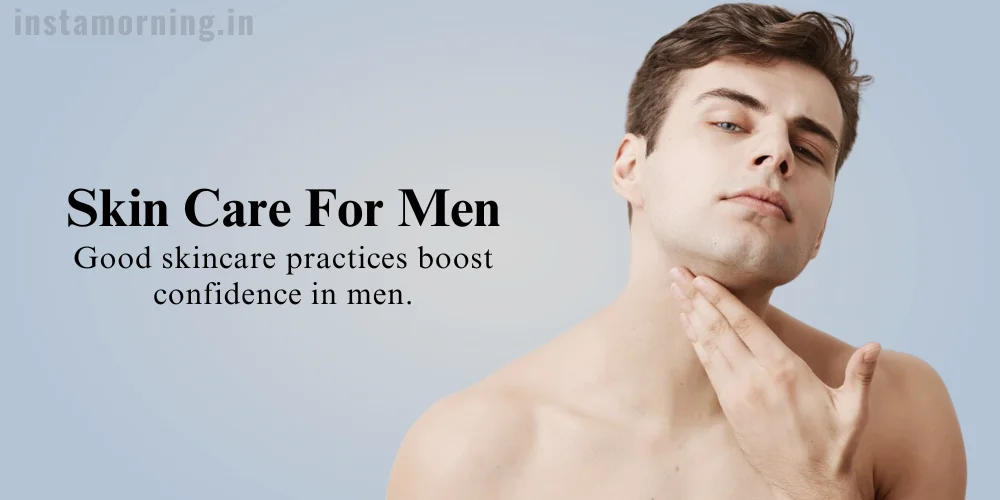
A basic skincare routine for men typically includes cleansing, moisturizing, and sun protection.
It contributes to preventing issues such as premature aging, wrinkles, and dark spots. Proper skin care can aid in managing specific skin concerns like acne or dryness, thereby enhancing overall skin health.
Additionally, a good skincare routine can boost confidence and self-esteem, providing a sense of self-care and grooming that can positively impact a person’s well-being.
Overall, skincare routines specifically designed for men are aimed at preserving skin quality and addressing common skin problems that anyone might encounter.
Products Every Man Should Use
The basic skin care products recommended for every man typically include:
Cleanser: A mild foaming cleanser to wash the face, especially before shaving, to reduce surface oil and remove impurities.
Repairing Products: An antioxidant serum (such as one with vitamin C) is applied in the morning to reduce oxidative stress caused by environmental factors like pollution and UV rays. For men in their 30s and above, retinol cream is recommended at night to help smooth fine lines and wrinkles.
Moisturizer and Sunscreen: A moisturizer with at least SPF 30 in the morning to protect against sun damage and skin aging. At night, a lightweight moisturizer without sunscreen may be used if the skin isn’t dry.
Aftershave or Post-Shave Balm: For men who shave, using a soothing aftershave lotion or post-shave balm can help reduce irritation and hydrate the skin after shaving.
Grooming Kits: A grooming kit for men is essential, offering a comprehensive solution tailored to individual needs, including skincare, hair care, and personal hygiene.
Role of Skincare in Men’s Self-Care
Here are the top reasons why skincare is important for men:
1. Maintains Healthy Skin
Skincare routines help in cleansing, nourishing, and maintaining healthy skin.
Proper skin care can prevent issues like acne, premature aging, and skin dryness.
2. Boosts Confidence and Appearance
Taking care of one’s skin improves overall appearance, boosting self-confidence.
Healthy skin contributes to a groomed and well-maintained look, positively impacting self-esteem.
3. Addresses Skin Concerns
Skincare routines can target specific skin issues like acne, dryness, or sensitivity, improving skin health. Tailored skincare routines help in managing common skin problems men might encounter.
4. Protects Against Environmental Factors
Skincare routines often include products with SPF, protecting the skin from sun damage and harmful UV rays. Skincare products act as a barrier against environmental pollutants and skin-damaging factors.
5. Promotes Self-Care and Well-Being
Engaging in a skincare routine is a form of self-care, promoting a healthy lifestyle and overall well-being.
A consistent skincare regimen signifies taking time for oneself and maintaining personal grooming, which contributes to mental and emotional wellness.
Overall, a good skincare routine for men goes beyond just aesthetics; it plays a crucial role in maintaining healthy, well-nourished skin and contributing to a confident and well-groomed appearance.
Skin care on a budget
Affordable skincare refers to products and routines that are cost-effective and don’t put a significant financial burden on individuals. It involves using skincare items that are reasonably priced while still being effective in maintaining skin health.
Here are some tips for you on doing skincare without spending much on skincare products:
Simplify Your Routine: Stick to a basic three-step routine: cleansing, moisturizing, and protecting your skin. This doesn’t require expensive products.
Limit Product Usage: Using fewer products reduces costs, avoids skin irritation, and minimizes the visibility of aging signs.
Follow Basic Skincare Habits: Cleanse your skin regularly but not excessively, moisturize when the skin is damp, and use sun protection to prevent skin damage.
Select Multi-purpose Products: Opt for products that serve dual functions, like a moisturizer with sunscreen.
Consider Affordable Alternatives: Items like petroleum jelly can serve multiple purposes like moisturizing dry skin and nails, which can be cost-effective.
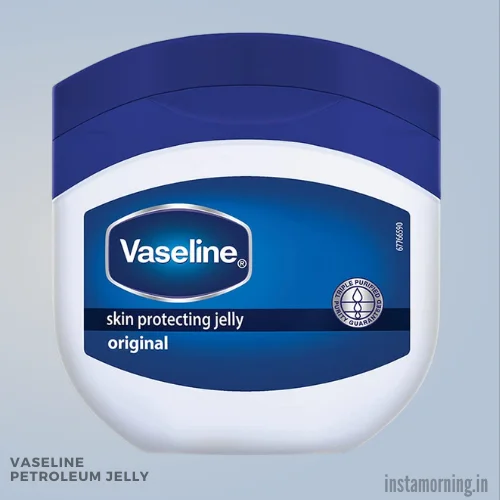
By following these tips such as using multi-functional products and affordable alternative options, we can minimize costs while maintaining effective skincare.
Professional Skin Care
Professional skin care refers to the utilization of specialized skincare products, treatments, and procedures that are administered by licensed and trained skincare professionals, such as dermatologists, aestheticians, or estheticians.
These treatments are typically more potent, effective, and tailored to individual needs compared to over-the-counter products.
When To See A Dermatologist?
Dermatologists are medical professionals specializing in skin health. You should consider consulting a dermatologist if you encounter persistent skin issues that don’t improve with over-the-counter treatments.

Here are specific skin concerns that necessitate a dermatologist’s evaluation:
1. Acne: When over-the-counter remedies fail to control or alleviate acne, a dermatologist can offer more effective treatments.
2. Rosacea: If rosacea symptoms such as redness, inflammation, or persistent pimples are troublesome, a dermatologist can provide tailored solutions.
3. Eczema: Dermatologists can offer management strategies for eczema symptoms like persistent itchiness, dryness, or skin cracking.
4. Hyperpigmentation: Dark spots or patches on the skin can be addressed more effectively by dermatologists.
5. Signs of Aging: Wrinkles, fine lines, age spots – dermatologists can recommend treatments to mitigate these signs.
6. Hair Removal: If you desire professional guidance or treatments for unwanted hair growth, a dermatologist can offer advice.
Prescription Treatments Overview
Prescription skin care treatments are specialized medications or therapies provided by dermatologists to address specific skin conditions.
These treatments often tend to be more potent or targeted than over-the-counter options:
1. Retinoids: Derived from vitamin A, retinoids are effective in treating acne, reducing the appearance of fine lines and wrinkles, and enhancing overall skin texture.
2. Antibiotics: Prescribed for acne caused by bacteria, antibiotics can combat the root cause of bacterial acne.
3. Azelaic Acid: Effective in treating acne, rosacea, and hyperpigmentation.
4. Corticosteroids: Used to reduce inflammation in the skin.
5. Isotretinoin: A potent oral medication primarily used to treat severe acne.
Cosmetic Procedures Overview
Cosmetic procedures range from minimally invasive to surgical interventions aimed at improving the aesthetic appearance of the skin.
1. Microdermabrasion: This minimally invasive procedure removes the top layer of dead skin cells, promoting improvement in fine lines, hyperpigmentation, and skin tone.
2. Chemical Peels: Using a chemical solution, chemical peels exfoliate the skin, effectively treating concerns like acne, hyperpigmentation, and fine lines.
3. Dermabrasion: A surgical procedure that treats acne scars, deep wrinkles, and fine lines by removing the top layers of the skin.
4. Laser Skin Resurfacing: Utilizing lasers, this surgical procedure addresses acne scars, wrinkles, and fine lines by removing the skin’s top layers.
5. Fillers and Neurotoxins: Injectable substances like hyaluronic acid and Botox are used to add volume or relax muscles in the face, reducing wrinkles.
Laser Treatments
Laser treatments utilize focused light to target and treat various skin conditions:
1. Laser Hair Removal: This treatment permanently reduces hair growth by targeting the hair follicles’ melanin.
2. Laser Skin Resurfacing: A surgical procedure to treat skin imperfections such as acne scars, deep wrinkles, and fine lines.
3. Intense Pulsed Light (IPL) Therapy: Non-invasive and utilizing light energy, IPL therapy treats skin conditions like hyperpigmentation, rosacea, and acne.
Chemical Peels
Chemical peels involve using a chemical solution to exfoliate and remove dead skin cells.
Peels are categorized based on their intensity:
1. Superficial Peels: Mild peels that remove the top layer of dead skin cells.
2. Medium Peels: More intense than superficial peels, removing the top two layers of skin, and can be more effective but potentially more irritating.
3. Deep Peels: The most intense type, removing the top three layers of skin.
Chemical peels are effective for addressing concerns such as acne, hyperpigmentation, and fine lines and wrinkles.
Microdermabrasion
This minimally invasive procedure involves a rotating head to gently exfoliate and remove the top layer of dead skin cells. Microdermabrasion is effective in improving fine lines, reducing hyperpigmentation, and evening out skin tone.
Usually performed as a series of treatments, it has minimal pain and downtime but can make the skin more sensitive to sunlight.
Each of these professional skin care methods serves unique purposes and targets different skin concerns. The choice of treatment depends on individual needs and should be decided in consultation with a qualified dermatologist or skin care professional.
Final Words
The journey towards healthy and radiant skin is underlined by a commitment to consistency, a tailored approach, and informed decisions.
Ensure healthier, radiant skin by following the advice and insights provided in this ultimate Skin Care Guide by InstaMorning.
Emphasizing the importance of consistency in skincare routines, identifying products suited to your skin type, and crafting a personalized routine stand pivotal in achieving optimal skin health.
Seeking a dermatologist’s guidance for persistent or severe skin concerns is crucial.
Consistently following a personalized routine and using tailored products can lead individuals to healthy, glowing skin that caters to their unique needs.


